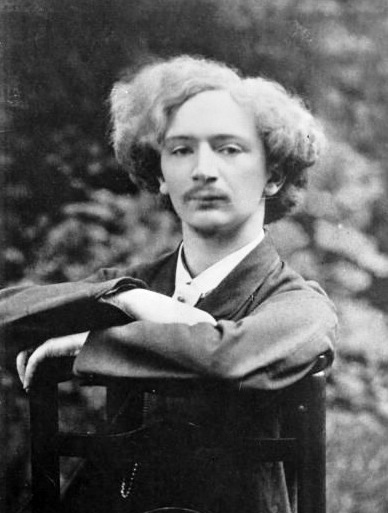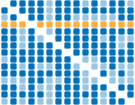Swinburne, Charles Algernon: Itülosz (Itylus in Hungarian)
|
Itylus (English)Swallow, my sister, O sister swallow, O swallow, sister, O fair swift swallow, Sister, my sister, O fleet sweet swallow, I the nightingale all spring through, Sister, my sister, O soft light swallow, Swallow, my sister, O singing swallow, O swallow, sister, O fleeting swallow, O sweet stray sister, O shifting swallow, O swallow, sister, O rapid swallow, O sister, sister, thy first-begotten!
*Philomela, a daughter of Pandion, king of Athens, and sister to Procne, who had married Tereus king of Thrace. Procne separated from Philomela, to whom she was particularly attached, spent her time in great melancholy till she prevailed upon her husband to go to Athens, and bring her sister to Thrace. Tereus obeyed his wife's injunctions, but he had no sooner obtained Pandion's permission to conduct Philomela to Thrace, than he became enamoured of her, and resolved to gratify his passion. He dismissed the guards, whom the suspicions of Pandion had appointed to watch his conduct, and he offered violence to Philomela, and afterwards cut off her tongue, that she might not be able to discover his barbarity, and the indignities which she had suffered. He confined her also in a lonely castle, and after he had taken every precaution to prevent a discovery he returned to Thrace, and he told Procne that Philomela had died by the way, and that he had paid the last offices to her remains. Procne, at this sad intelligence, put on mourning for the loss of Philomela; but a year had scarcely elapsed before she was secretly informed, that her sister was not dead. Philomela, during her captivity, described on a piece of tapestry her misfortunes and the brutality of Tereus, and privately conveyed it to Procne. She was then going to celebrate the orgies of Bacchus when she received it; she disguised her resentment, and as during the festivals of the god of wine, she was permitted to rove about the country, she hastened to deliver her sister Philomela from her confinement, and she concerted with her on the best measures of punishing the cruelty of Tereus. She murdered her son Itylus, who was ir the sixth year of his age, and served him up as food before her husband during the festival. Tereus in the midst of his repast, called for Itylus, but Procne immediately informed him that he was then feasting on his flesh, and that instant Philomela, by throwing on the table the head of Itylus, convinced the monarch of the cruelty of the scene. He drew his sword to punish Procne and Philomela, but as he was going to stab them to the heart, he was changed into a hoopoe, Philomela into a nightingale, Procne into a swallow, and Itylus into a pheasant. This tragical scene happened at Daulis in Phocis; but Pausanias and Strabo, who mention the whole of the story, are silent about the transformation; and the former observes that Tereus, after this bloody repast, fied to Megara, where he destroyed himself. The inhabitants of the place raised a monument to his memory, where they offered yearly sacrifices, and placed small pebbles instead of barley. It was on this monument that the birds called hoopoes were first seen; hence the fable of his metamorphosis. Procne and Philomela died through excess of grief and melancholy, and as the nightingale's and swallow's voice is peculiarly plaintive and mournful, the poets have embellished the fable by supposing that the two unfortunate sisters were changed into birds.
|
Itülosz (Hungarian)Fecske, hugocskám, ó húgom, fecske! Ó fecske, húgom, ó szép, gyors fecske, Húgom, hugocskám, sebes, szép fecske, Ha a tavasz jön, én, csalogány, Húgom, hugocskám, lágy, könnyű fecske, Fecske, kis húgom, éneklő fecske, Ó fecske húgom, ó fürge fecske, Kis kósza húgom, ó sikló fecske, Ó fecske húgom, száguldó fecske, Ó húgom, húgom, az elsőszülötted!
*A teljes történet Ovidius Átváltozások című művében olvasható Procne és Philomela címmel. A történet röviden: Tereus, Trákia királya katonai segítséget nyújt egy háborúban Pandionnak, aki ennek köszönhetően győz. Pandion hálából Tereusnak adja idősebb lányát, Procnét. Tereus titokban Procne húgát, Philomelát szereti. Procnéval hazautazik Trákiába, boldogtalan nászukból megszületik fiuk, Itys. Néhány évvel később Procne megkéri Tereust, hogy hozza el neki Philomelát Athénból, amit Tereus meg is tesz, ám hazautazás közben megerőszakolja Philomelát, majd kivágja a nyelvét, hogy ne mesélhesse el mi történt vele. Hazaérve bebörtönzi, rendszeresen látogatja, miközben Procnénak azt hazudja, húgát a farkasok ették meg útközben. Philomela eközben lepedőbe szövi történetét, az elkészült szövetet elküldi Procnénak, aki ezt elolvasva megtalálja és kiszabadítja testvérét. A két nővér szörnyű bosszút esküszik: Ityst anyja meggyilkolja és felszolgálja vacsorára férjének, Tereusnak. Amikor Tereus rájön, mit tett Procne, meg akarja ölni a nővéreket, de az istenek közbeavatkoznak, mindhármukat madárrá változtatják.
|
||||||||||






